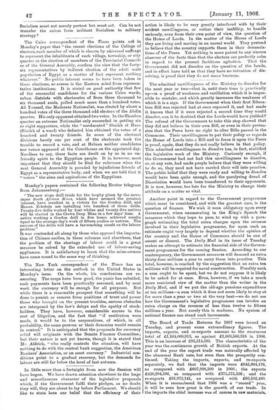The Cairo correspondent of the Ilimes points mit in Monday's
paper that "the recent elections of the College of electors, each member of which is choaen by universal suffrage to represent the inhabitants of each village, township, or city quarter at the election of members of the Provincial Councils or of the General Assembly, confirm the view that the forty- six representatives by indirect election of the adult male population of Egypt as a matter of fact represent nothing whatever." No public interest seems to have been taken in these elections, so averse is the Eastern mind from represen- tative institutions. It is stated on good authority that few of the successful candidates for the various Cairo wards, urban districts with electorates of from three thousand to six thousand souls, polled much more than a hundred votes. Ali Youssef, the Moderate Nationalist, was elected by about a hundred votes of the three thousand odd electors of the Abdin quarter. His only opponent obtained two votes. In the Shoubrit quarter an extreme Nationalist only succeeded in getting six or eight supporters, while the "uneducated" Sheikh el Hama (Sheikh of a ward) who defeated him obtained the votes of a hundred and twenty friends. In some of the electoral divisions barely one per cent. of the electorate took the trouble to record a vote, and at Helivan neither candidates nor voters appeared at the Courthouse on the appointed day. Needless to say, these facts are dwelt on by us in no un- friendly spirit to the Egyptian people. It is, however, most important that they should be filed for reference when the next General Assembly is paraded by injudicious friends of Egypt as a representative body, and when we are told that it "voices" the aims and aspirations of the Egyptians.










































 Previous page
Previous page